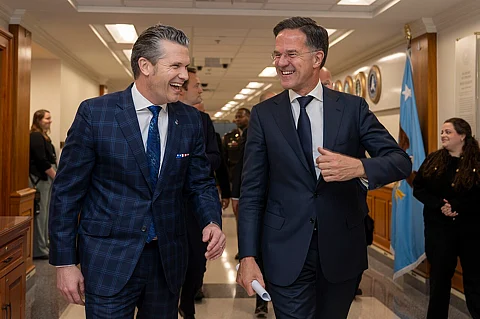

NATO members must increase their air and missile defenses by 400% to counter the growing threat from Russia, Secretary General Mark Rutte warned Monday, suggesting Moscow could be prepared to attack the alliance within five years.
Speaking at London’s Chatham House think tank, Rutte stressed that NATO must undergo a dramatic transformation to match Russia’s military production and readiness. "Wishful thinking will not keep us safe," he said. "We cannot dream away the danger. Hope is not a strategy. NATO must become a stronger, fairer, and more lethal alliance."
Rutte, a former Dutch prime minister, urged all member states to commit to raising defense spending to 3.5% of GDP, with an additional 1.5% allocated to infrastructure like roads, bridges, and military bases—effectively meeting U.S. President Donald Trump’s demand for a 5% target. The proposal is expected to be a key topic at NATO’s summit in The Hague on June 24-25.
Rutte cautioned that Russia’s military buildup poses an immediate risk, regardless of the outcome of the war in Ukraine. "Russia could be ready to use military force against NATO within five years," he said. "We are all on the eastern flank now."
He pointed to Russia’s rapid ammunition production—outpacing NATO’s output threefold—as evidence of the urgent need for rearmament. NATO allies must also acquire thousands more armored vehicles, millions of artillery shells, and expanded logistical support, he added.
The call for increased spending comes as European members, including the UK and Germany, reassess their defense postures. British Prime Minister Keir Starmer has pledged to raise military spending to 2.5% of GDP by 2027, with a further increase to 3% by 2034. Last week, the UK announced plans to bolster its nuclear submarine fleet and prepare its army for potential conflict in Europe.
Rutte praised the UK’s commitment as "very good stuff" but emphasized that broader NATO coordination is essential, particularly as the U.S. shifts its focus toward China. "America has carried too much of the burden for too long," he acknowledged, while dismissing fears of an abrupt U.S. withdrawal from Europe.
The Kremlin dismissed Rutte’s warnings as exaggerated, with spokesperson Dmitry Peskov accusing NATO of fostering confrontation. "European taxpayers will spend their money to defuse some ephemeral threat," he said.
As NATO prepares for a pivotal summit, Rutte’s stark message underscores the alliance’s precarious position: rearm rapidly or risk vulnerability to an emboldened Russia.